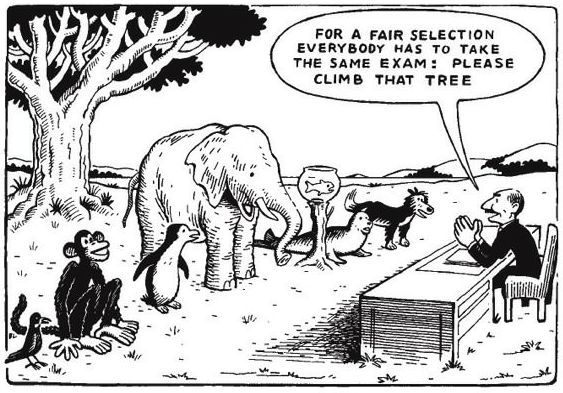There is a problem in the tech community called “Devsplaining“. This notion is used to describe when “experts” condescendingly explain to others the “proper way to code”.
The thing is that there is really is no proper way to code. Usually, the “experts” unnecessarily complicate stuff. As a result, most beginners think they need to study coding for years and know everything about the latest technology before they are capable of contributing anything valuable. With this kind of mindset, most never share anything they create. In tech, this means that people never launch their project or never even start because they think they aren’t ready.
Exactly the same problem exists in physics, mathematics and probably most other scientific fields. The problem is so widespread that there isn’t even a name for it. It’s just so normal.
As a result, many people feel they are not good enough to contribute. This is a problem because people who overcomplicate things exclude many brilliant minds who really could make a difference.
It’s nonsense that you need to spend your best years doing complicated calculations to prove they are good enough. It’s nonsense that you must be capable of doing the most complicated calculations before you can add something. It’s nonsense that you need to master every mathematical aspect before you can contribute anything significant to the field.
Novel deep insights can originate from everywhere.
Possibly from a rigorous proof.
Possibly from a long and complicated calculation.
Possibly from a simple thought experiment.
It’s not too hard to find examples for each of them:
- t’Hoofts proof of renormalizability.
- Onsager’s Ising model “tour de force” calculation
- Einstein’s elevator thought experiment that guided him towards general relativity.
Moreover, making huge discoveries is not the only possibility to help physics move forward. To quote Sir William Lawrence Bragg
“The important thing in science is not so much to obtain new facts as to discover new ways of thinking about them”
There is a famous cartoon (based on a quote, often attributed to Einstein) that summarizes the problem nicely:

If you now roll your eyes because you have seen this cartoon already 100 times, please let me explain.
The thing is that while in exams the task usually is comparable to the task “climb the tree” here, the overall “task”, for example, in physics is much broader. Maybe more like “understand the tree”. Climbing the tree is a viable possibility to understand some aspects of the tree, but certainly not exhaustive.
The thing is that “Devsplainers” try to convince everyone that the only thing worth doing is to climb the tree and that you have to do it in a very specific way.
However, with a broader goal like “understand the tree” in mind it’s easy to imagine how each of the animals in the cartoon could contribute.
The fish and bird could together figure out where the water comes from that are crucial for the tree. The elephant could use his strength to open up a “window” to look inside… You get the idea.
As an aside: From this perspective, it’s clear how problematic it is that students usually are only asked to “climb the tree” in exams. Many students who could contribute in other ways are filtered out. However, this is a quite different story I don’t want to dive into here.
So how could the situation be improved?
I have two concrete ideas.
- I’m currently building a “Travel Guide to Physics“. The goal here is to show that nothing is really complicated. There are lots of different ways to tackle a subject and not every explanation is suited for everyone. Instead, everyone needs to find explanations that speak a language he/she understands and that’s what the Physics Travel Guide helps with.
- I’m trying to get more people to share what they learn. The thing is, as I like to emphasize, beginners need explanations from beginners to understand something and not polished stuff from “Devsplainers” who overcomplicate everything. If more people would share what they learn, everyone could learn more easily. Currently, we “are an army of wheel-reinventors” and I would like to help to change that. Moreover, sharing notes while learning is an example of how students can start contributing early on. Now, why aren’t more students doing this? There are two major obstacles:
-
-
-
-
- Many don’t know they are “allowed” to do this or that others would care about their notes and
- many don’t know how to do publish their notes online.
-
-
That’s why I created Physicsnotes.org. My goals with this project are
-
-
-
- to motivate people to share their notes and show them that they don’t need permission.
- To give them the tools and knowledge to do so.
-
-
(I really regret that I didn’t publish my notes while I was a student. While some of them are now published as a book, the majority of them no longer exist.)
-
So these are just my ideas. I’m certain there are more and I would love to hear them. Moreover, I think a crucial first step would be to give the problem a name like the tech people did with “Devsplaining”. With a fitting name, people could start to call people out for overcomplicating things and frighten beginners. So if you have an idea, please let me know.
-